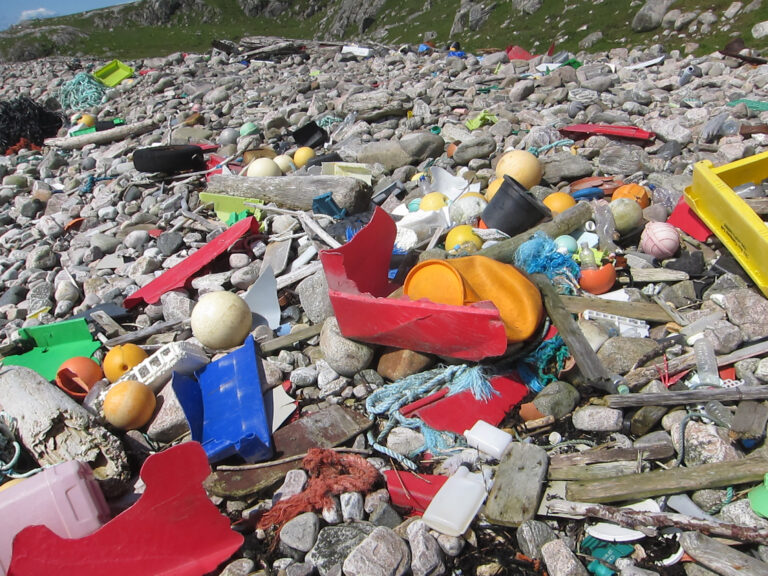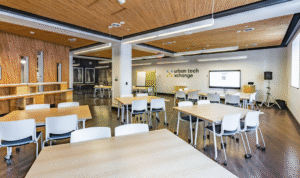
- Kim Kisner
- Education
- 10/25/2022
Dr. Ian Lambert, Dean of Graduate Studies & Research Introduces the New Design for Climate Action Master's Program

In the fall of 2023, the College for Creative Studies will launch Design for Climate Action – a new graduate program aimed at tackling the global climate action and change emergency from multiple angles.
The program invites applications from designers and non-designers of all kinds, bringing together broad multidisciplinary mindsets for interdisciplinary collaboration. It will foster an understanding of zero-waste materials and processes, circular economies, civic infrastructures, and environmental stewardship. At its heart is the drive to bring about change in existing systems and transition to structures that reverse global heating and uphold climate justice and global equity.

Leading the program is Dr. Ian Lambert, Dean of Graduate Studies & Research. Lambert is a designer and maker-researcher with extensive experience in academic leadership and curriculum development in higher education in the U.K., the U.S., and China.
Lambert has taught sustainable design for more than 20 years and his work with ocean plastic in Scotland along with other waste streams is widely published. He has brought his work with ocean plastic to the Great Lakes and recently joined the Detroit River Coalition. For the last two years, he has been collaborating with the Charles H. Wright Museum of African American History on the d.Tree Studio – diverting dying trees from landfills to become narrative artifacts that elevate climate justice. He is a Fellow of the Royal Society of Arts, and a former advisor to the Creative Conscience Awards.
SBN Detroit spoke to Lambert about the program.
Q: What is the impetus behind the new Design for Climate Action Master’s Program?
A: In addition to further embedding sustainability across the CCS curriculum, we are looking to highly specialize in addressing the climate crisis. This is about working toward and educating about systemic change.
There are many perspectives required in tackling climate action, so the program is about foregrounding design thinking at the intersection of multiple disciplines. The program welcomes scientists, engineers, philosophers, and sociologists as well as designers and other creatives. It is the synergy formed by these different skill sets that can drive change in the climate crisis. It’s important to remember that while science presents the facts and explains what is happening, the climate crisis is a cultural crisis, a social crisis, an economic crisis, and a political crisis. It affects humankind in many different ways and it’s not just for scientists to solve.
The program takes the position of stating climate problems calmly and rationally. We need to use intelligent and persuasive narratives to bring others, including business leaders and politicians, with us. The debate is often highly polarized, which is dangerous. So, it is important to temper our outrage and avoid alienating those across the divide.
Q: What does it mean for CCS to offer this program? Is this kind of curriculum unique to design school offerings?
A: The program is focused on action in the climate crisis and systemic change. I don’t know of any other program that takes such a multidisciplinary approach with design at its hub. Also, our grad program is growing, and part of our strategy is to consider where the needs are and identify opportunities for aligning with the activity that’s happening in Detroit.
Essentially the program has three pillars that overlap and blend:
- The circular economy and closed-loop manufacturing and material cycles.
- Systems and infrastructures – How we can redesign these or make interventions and design out waste?
- Environmental stewardship and understanding the lasting effects of human production on our environment
Q: What implications might this have for the Detroit businesses – graduates with this skill set and education coming into the workforce?
A: A recent report in the Atlantic stated that the government will be spending $374 billion on fighting climate change, and some are estimating it will reach $800 billion.
This will require experts of all kinds to implement and lead change within businesses, corporations, and public organizations. Experts who can galvanize collaboration and take action in multiple ways.
The demand for climate design experts is only going to grow, and our graduates will go into the world with not only the expertise but the passion and capability to apply a persuasive narrative to bring about these changes.
Q: Can you tell us more about bringing together broad multidisciplinary mindsets for interdisciplinary collaboration?
A: At the graduate level all design programs operate at disciplinary intersections. The climate change crisis is omnipotent, and the key to this (working to solve it) is being capable of working with other areas of expertise. This is not a crisis to be dealt with by lone crusaders. It truly requires collaboration that is deep and expansive. So it’s really important to develop students into leaders who can advance this approach.
When it comes to leadership, there is this concept of the T-shaped individual, where the vertical bar on the letter T represents the depth of related skills and expertise in a single field, and the horizontal bar is the ability to collaborate across disciplines with experts in other areas and to apply knowledge in areas of expertise other than one’s own.
And then there are X-shaped individuals, with “executive” skills and deep expertise in a core knowledge area as well as strong leadership skills and credibility.
We need both T-shaped and X-shaped skill sets to approach and address the climate crisis, and our program will work toward building these.
Q: Will the students be involved in sustainability programs and projects in Detroit?

A: CCS has an extensive and well-established set of partnerships and connections with industry and our students work on many sponsored and live projects.
Currently, students are working with Consumers Energy to help implement EV charging services from a user experience perspective. Last year, our students worked with the Charles H. Wright Museum of African American History on redirecting dying trees from landfill to narrative objects. Our students have worked on clean air projects, food waste diversion, water security, sustainable tourism, and green mobility systems, to name a few.
I’m also very proud of the CCS Color and Materials Design Students who won the annual Biodesign Challenge in 2020 and 2021. This is an international student design competition that partners high school and university students with scientists, artists, and designers to envision, create, and critique transformational applications in biotech.
The more live projects the better for students to understand the breadth and reach of the climate crisis in the many areas that exist.
We are also discussing student expeditions into the natural world to see for themselves the effects of climate change, which is so powerful in advocating for change.
Q: What are you most excited about regarding the launch of this program at CCS?
A: That we have the opportunity to bring about change…in the community, in Detroit and Michigan and the U.S. and the world.
It’s a great privilege to teach. I’m excited to work with students and also learn from them so that we can equip ourselves to be better climate citizens.
Q: What drives your passion around this?
A: In the ’90s I was working in London as a furniture maker and designer. I was working with reclaimed wood and was invited to take part in an exhibition called Reclamation. So, I needed timber. I went to a nearby worksite and asked the foreman, who pointed to a huge pile of wood and said to take what I wanted, as they’d be setting fire to it at the end of the day. What a ludicrous waste! I made five or six pieces of furniture from that wood, sold most of it, and still have one piece in my home today. This started a fascination with waste streams.
Eight years ago, I became interested in ocean plastic. When you are standing on a beach on a remote Scottish island, you see the impact of human manufacturing on a global scale. It’s this perverse random commodity flow of material along ocean routes that shouldn’t be there. Estimates vary, but between eight and twelve million tons of plastic go into our oceans every year. A lot of plastic is relatively easy to recycle, so why would we do that?
Many things drive my motivation behind trying to find solutions for climate change, but dealing with waste and upholding climate justice is at the fore.
Q: Given your background living and working and teaching internationally, what is your perspective on Detroit in terms of where the city is when it comes to designing for a more sustainable future?
A: I recently attended the Sustainable Detroit Forum, and there is so much happening in this city! I genuinely believe the design expertise in Detroit is incredible.
Because Detroit is going through this extraordinary revival and rebuilding after several cycles of trauma, the city is proudly advancing innovation and creativity. Detroit has an opportunity to lead the charge in making systematic changes as we rebuild our systems.
This regrowth also presents the prospect of implementing radically new ideas for designers. Detroit is a great place to study design generally, but, further, it’s a great place to nurture leadership in the climate crisis, using the powers of creativity.
The College for Creative Studies is hosting Cumulus Detroit 2022: Design for Adaptation Conference, 2-4 November – tickets are still available.
Be sure to subscribe to our newsletter for regular updates on sustainable business practices in and around Detroit.
Kim Kisner
- All
- Business
- Community
- Education
- Events

Eastern Market Partnership, in collaboration with the City of Detroit’s Office of Sustainability Urban Agriculture Division, has announced $240,000 in grant funding to support Detroit-based farmers and farmer collectives. The grants will advance food access, climate education, sustainable land use, and economic opportunity, with priority given to Black- and Indigenous-led farms, youth-led initiatives, and projects rooted in historically disinvested neighborhoods. The recipients – ranging from cooperatives and community...

Citizen Robotics is a Detroit-based nonprofit that advances the use of robotics and digital manufacturing in residential construction, focusing on improving productivity, sustainability, and long-term affordability. Best known for its early work in 3D-printed housing, it explores how alternative construction methods and new financial models can reduce material waste, lower lifetime operating costs, and enhance the resilience of homes. SBN Detroit interviewed Tom Woodman, founder and president of...

Detroit-based OneSix Energy is a clean-energy technology company focused on advancing a lower-carbon approach to hydrogen production. Headquartered at Newlab in Detroit, the startup is developing a proprietary methane pyrolysis system designed to produce hydrogen without carbon dioxide emissions, while also generating solid carbon as a co-product. SBN Detroit interviewed with cofounder Stefan Sysko about the company’s origins, its approach to hydrogen production, and why Detroit is positioned...







